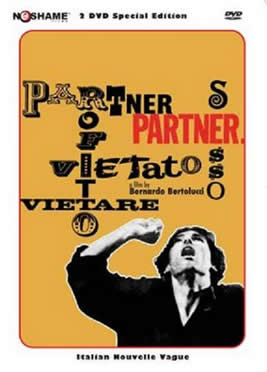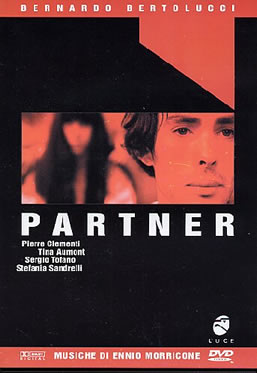The
Charge
"It still has to be established whether it's me who looks
like you, or vice versa." -- Giacobbe to Giacobbe
Opening
Statement
Bernardo Bertolucci's third feature, 1968's Partner, is
an odd duck. It's as though in taking one step forward as
an artist, he had to take two steps back.
Bertolucci
inherited the directorial reigns of his debut feature La
Commare Secca (1962) from his mentor Pier Poalo Pasolini
when the ideas that would blossom into Mamma Roma caused
Pasolini to lose interest in the project. The young Bertolucci
was supposed to deliver a film in the style of Pasolini.
That La Commare Secca has a visual style entirely unlike
Pasolini's was the first sign that Bertolucci would be a
unique and powerful voice in world cinema.
The
young director more fully asserted his burgeoning powers
in his second feature, 1964's Before the Revolution. The
picture was clearly influenced by the French New Wave, but
was sufficiently Bertolucci-esque to grab the attention
of cineast??s around the world.
In Partner,
Bertolucci regresses into an almost pure imitation of Jean-Luc
Godard. The movie is rife with the ironic emotional detachment,
anti-narrative sensibilities, and self-reflexive examination
of the conventions of cinema that characterize Godard's
work. Bertolucci's na?vet?? shines through the Godardian
veneer, however, in the lead character's earnest assertions
of the theater's potential as a tool for political revolution.
A Godard film actually made by Godard would be far more
cynical about the power of theater or cinema to change anything.
Partner, then, is less a Bertolucci film than Godard-lite.
A fascinating peek at a young director stumbling toward
greatness, it isn't particularly satisfying in and of itself.
Facts
of the Case
Giacobbe (Pierre Cl??menti, The Leopard) is a half-mad young
drama teacher with a habit of talking to himself. He lives
in a small apartment, stacked with books he's bought and
stolen. Petrushka, his masochist landlord, pretends to be
his servant. Giacobbe is in love with Clara (Stefania Sandrelli,
Divorce Italian Style), the bourgeois daughter of his mentor.
When the old professor publicly rejects him, he contemplates
suicide but is saved by the appearance of his doppelg?nger,
Giacobbe.
This
second, anarchic Giacobbe makes violent love to Clara and
prods his tame double towards a revolutionary stance against
the Vietnam War. The first Giacobbe, convinced theater is
the only path to truth, incites his students to revolution
with avant-garde performances that include the construction
of Molotov cocktails.
Mayhem
and even a little murder follow as the Giacobbes' psyche
or psyches -- like the film's narrative -- unravel.
The
Evidence
From the vantage point of the early 21st century, Partner
might only be a curious cul-de-sac in the career of Bernardo
Bertolucci if not for its fascinating intersection with
2003's The Dreamers. The events of the two films occur at
the same moment in history: that tumultuous European spring
of 1968 when French students rioted over the politically-motivated
caning of Henri Langlois from the Cin??math??que Fran?ais,
and students throughout Italy began protests that would
radically alter the political landscape in Bertolucci's
home country over the next decade. With their common setting,
abundant homage to the French New Wave, and shared theme
of duality (aren't The Dreamers' Isabelle and Theo, on some
level, dual aspects of a single psyche?), one has to wonder
if Bertolucci didn't design the 2003 film as an examination
and update of Partner. Moreover, since Bertolucci was actually
making Partner during that politically topsy-turvy year
in which both it and The Dreamers are set, it's as if the
two films, when viewed in tandem, offer up a third set of
twins: the Bertoluccis, young and old.
In Partner,
Bertolucci plays a kind of theme-and-variation with Fyodor
Dostoevsky's novella, The Double, upon which the film is
loosely based. Where Dostoevsky used the unruly doppelg?nger
of his hero, Golyadkin, to express disdain for the egocentrism
of modern man, Bertolucci's double is a force for positive
change. The second Giacobbe's anarchic rage is the spirit
of the countercultural revolution, a spirit that seeks to
destroy the existing social order. Even his frightening
and inexplicable violence seems to be viewed by Bertolucci
as the necessary means to a politically noble end. Near
the end of the film, the original Giacobbe (to the extent
that there's a distinction between the two at that point
in the story) urges us all to unleash the feral twins of
our outer, socially-compliant natures. It is the only hope
of creating real political and social change. The cloistered,
incestuous existence of the three protagonists in The Dreamers,
their separation from the angry protests on the streets
outside (though they identify politically with the protestors)
might be read as an admission by the older Bertolucci that
the call-to-arms from his younger, more idealistic self
fell on too many deaf ears to produce lasting change.
While
Partner's ample Godardian flourishes are derivative, they're
also fun if you're game. It would be entirely disappointing
to see a director as talented as Bertolucci imitate another
filmmaker if not for the fact that his imitation is so spot-on.
In keeping with the French convention and in defiance of
Italian norms, Bertolucci shot with live sound. He counters
the naturalism of the sound by abruptly dropping out the
entire soundtrack at points, leaving us in silence -- an
old trick of Godard's meant to remind viewers they're watching
a movie. Aggressive scene transitions undermine narrative
coherence, and also prevent one from connecting with the
characters emotionally. Despite all this, the young Bertolucci
betrays his lack of absolute dedication to anti-narrative,
anti-cinematic conceits by offering a comically engaging
sequence early on in which Giacobbe boxes his own outsized
shadow, and a plethora of expertly executed in-camera effects
that allow Pierre Cl??menti to appear onscreen with himself
throughout the picture.
NoShame
presents Partner in an anamorphic widescreen transfer framed
at the film's original 2.35:1 aspect ratio. The image is
clean and sharp, but marred a bit by an abundance of edge-enhancement
halos. Colors are accurate and fully saturated. Black levels
are solid without being overblown. Despite the minor flaws,
it's a fine-looking transfer overall.
Audio
is a mostly hiss-free two-channel presentation of the original
Italian mono track. Optional English subtitles are available.
Supplements
on Disc One of this two-disc Special Edition include two
video interviews: Dreams from the Other Side and To Edit
a Partner. The first is a 1968 look behind the scenes as
Bertolucci filmed Partner. The director (looking like Godard's
little brother behind a pair of sunglasses) talks about
the cinematic concepts and political ideology behind the
film, as well as addressing technical issues such as his
choice to use live sound. The black-and-white 1.33:1 image
is offered window-boxed inside a 1.85:1 anamorphic widescreen
frame. Dreams from the Other Side runs 38 minutes. To Edit
a Partner is a retrospective interview with Partner's editor
Roberto Perpignani, produced by NoShame for this DVD release.
Perpignani discusses the radical editorial style of the
film, and how it meshes with Bertolucci's political and
philosophical message. The interview runs 18 minutes.
In addition
to the two interviews, the first disc contains Lost &
Found, a nine-minute reel consisting of Pierre Cl??menti's
screen test, and some outtakes. A gallery of poster art
and production stills runs as a 40-second featurette.
Instead
of Partner-related supplemental material, Disc Two houses
a second feature, critic Edoardo Bruno's single attempt
at filmmaking, His Day of Glory. The film is loosely related
to Partner in that Bertolucci was impressed enough with
it to allow Bruno to front his movie with a few minutes
of Giaccobe's revolutionary rantings. The footage from Partner
fits well into His Day of Glory, which basically gives us
a fly-on-the-wall perspective as three young revolutionaries
discuss Marxism and the necessity of and moral justifications
for the use of violence in overturning entrenched political
systems. It's pretty dry stuff, shot with little flair (there
were reasons, it seems, that Bruno ended up a critic rather
than a director).
The
picture is offered in a rough transfer, framed at its original
1.33:1 ratio. The unrestored image of this long-forgotten
piece of political polemic is speckled with source damage.
The audio track is similarly laced with hisses and pops.
There's nothing much to complain about in terms of transfer-related
flaws, though. NoShame did a great job with a weak source.
There's not a lot of justification for sinking time and
money into the restoration of a film as obscure and, to
be blunt, void of artistic and technical quality as His
Day of Glory.
The
supplementary feature is accompanied by a 35-minute interview
with Bruno, produced by NoShame for this DVD release. There
is also a reel similar to the Lost & Found segment on
Disc One that contains screen tests for Lou Castel and Laura
Troschel, and footage of the actors rehearsing their parts.
The
insert booklet contains two essays by Richard T. Jameson,
former editor of Movietone News and Film Comment. The first
discusses Italian cinema in the 1960s, and Bertolucci's
role in the break from the Neorealism that characterized
the nation's films of the '40s and '50s. The second provides
some insightful analysis of Partner. Film critic Sean Axmaker
also contributes an essay about Bertolucci, and there's
a selected filmography. Finally, "It Was the End of
the World as We Knew It, and We Felt Fine" is a brief
essay by Edoardo Bruno in which he discusses His Day of
Glory and its rescue from obscurity by NoShame.
Closing
Statement
Partner isn't a bad film per se, but it's a bad Bertolucci
film. He can and has done so much better. This disc won't
hold much appeal for anyone other than Bertolucci completists
and budding Marxists revolutionaries, though the latter
group would probably find listening to a little Rage Against
the Machine a better use of their time.(here)
|

